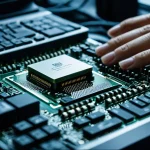Key Milestones in UK Computing Hardware Development
The UK computing hardware history is marked by pioneering achievements that laid the foundation for modern technology. One of the earliest computing milestones was the Colossus, developed during World War II for code-breaking. This machine was among the first programmable digital computers and showcased the UK’s innovative approach to wartime technology.
Following Colossus, the Ferranti Mark 1 was introduced as one of the world’s first commercially available general-purpose computers. This model further contributed to the technology timeline with its use in both scientific and business applications, highlighting the UK’s early commitment to advancing computing hardware.
In parallel : Tethered drones: redefining real-time aerial surveillance
The rise of microprocessors in the UK began with devices like the BBC Micro, which played a crucial role in education and popularizing computing in the 1980s. This period also saw the emergence of the ARM architecture, a significant British invention that revolutionized the tech world. ARM processors are now widely used globally, underpinning mobile devices and embedded systems.
Influential companies such as Acorn Computers and inventors like Sophie Wilson were central to these achievements. Their work helped position the UK as a leader in both historical milestones and ongoing developments in the computing hardware sector. Understanding this rich history clarifies how the UK continues to impact today’s technology landscape.
Topic to read : How does UK computing hardware contribute to the development of smart cities?
UK Hardware Innovations Shaping Modern Technology
The UK has played a pivotal role in hardware advancements that define today’s digital landscape. Notably, the development of the ARM architecture stands as a cornerstone of modern technology impact. ARM’s design, originating from UK innovation, powers the majority of smartphones and tablets worldwide due to its energy-efficient and compact chip architecture.
This architecture’s influence extends beyond mobile devices; it is now integral to laptops, IoT (Internet of Things) gadgets, and wearable technology, driving smarter and more connected experiences. UK hardware advancements have contributed to refining these digital devices by focusing on low power consumption without compromising performance.
UK research has also pioneered techniques in energy efficiency and miniaturization, ensuring devices remain lightweight and long-lasting on a single charge. Such progress addresses consumer demands for reliable, portable technology and supports the rise of interconnected smart environments.
With continuous innovation, the UK hardware sector remains at the forefront, pushing boundaries to blend power and efficiency. This solid foundation in ARM architecture and related technologies shapes not only consumer electronics but the broader scope of modern technology impact worldwide. Its legacy underpins the seamless operation of the digital devices we rely on daily.
Everyday Technologies Tracing Roots to UK Computing
Many consumer devices we use daily owe their functionality to foundational UK-origin tech. For example, the principles behind modern smartphones are deeply influenced by research done in British computing labs. Early UK innovations in microprocessor design and data transmission set the stage for the compact, powerful chips driving today’s mobile devices.
Smart home technology similarly benefits from UK-developed hardware concepts. Innovations in wireless communication and sensor integration pioneered in UK research environments now appear in smart thermostats, security cameras, and voice assistants. These advancements provide practical benefits like energy efficiency and improved home security to everyday users.
Medical devices also showcase UK-origin tech prominently. Computing breakthroughs in the UK contributed to the miniaturization and programming of diagnostic tools and monitoring devices, which offer real-time data crucial for patient care. This real-world impact stems directly from hardware evolution, highlighting the UK’s role in advancing healthcare technology.
Thus, UK computing hardware developments are not confined to research but extend to a broad spectrum of everyday technology. Understanding these connections helps appreciate how foundational UK tech continues to enhance consumer experiences across various domains.
Expert Analysis and Ongoing Influence
The UK tech legacy remains a formidable foundation in modern computing. Industry experts frequently highlight how pioneering innovations from the UK continue to inform the design principles of today’s hardware. For example, many startups leverage these early contributions to develop cutting-edge solutions with global impact.
When asked about the lasting influence, experts emphasize the UK’s role in setting hardware standards that persist across various sectors. These standards ensure interoperability and performance consistency, crucial for current and future technologies. In addition, historians note that the UK’s early focus on modularity and scalability directly shapes the trajectory of contemporary computing.
Looking ahead, the future computing landscape is poised to build upon these foundations. Industry opinion suggests that upcoming innovations in areas like quantum computing and AI hardware could owe much to the UK’s prior research methodologies and engineering disciplines. The deliberate collaboration between academic institutions and private enterprises in the UK fuels continuous progress, inspiring startups worldwide to emulate this model.
In summary, expert insights affirm that the UK’s tech history is not merely a relic but an active, evolving influence, guiding both present developments and tomorrow’s breakthroughs in computing.




